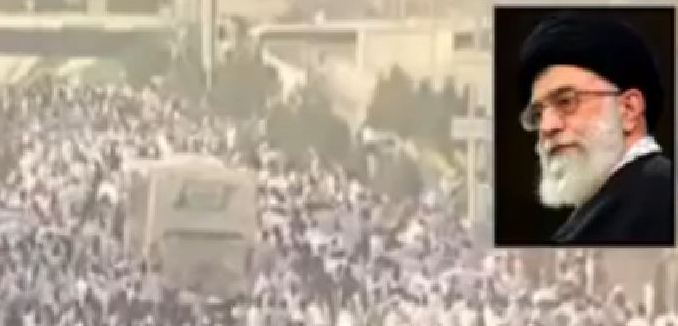There has been some confusion over the degree to which the Iranian regime has moderated its rhetoric in the aftermath of Iranian President Hassan Rouhani’s election. On October 1st there was something of a media dust-up regarding the possibility that some top Iranian officials had ceased publicly denigrating Israel as the “Zionist entity.”
The phrase and its eliminationist resonance had long been a standard part of the Iranian leaderships’ statements, and there was wide coverage of the possibility that Tehran was moving away from its use.
On October 2nd Al Jazeera conveyed comments from Rouhani blasting the “Zionist regime.” Last week it was the turn of Supreme Leader Ali Khamenei, who took the occasion of the Hajj to rail against “the criminal Zionist network” and the “Zionist regime”:
Knowing the enemy and its methods is the second important factor. First, we should not forget about the existence of a spiteful enemy. Performing the ritual of the stoning of the jamarat during hajj is a symbolic sign of this awareness. Second, we should not make a mistake in knowing the main enemy, who in the present time is global arrogance and the criminal Zionist network… For decades, the oppressed Palestinian nation has been receiving strikes as a result of the crimes of the Zionist regime and its supporters. In the countries of Afghanistan, Pakistan and Iraq, terrorism – which originates from the policies of global arrogance and its agents in the region – has ruined the lives of the people.
In any case, recognition of Israel and its right to exist seems to be a non-starter for the Iranian regime, the nuances of particular phrases aside. When approached by a reporter from the Israeli outlet Yediot Achronot at the United Nations and asked for a comment, Iran’s Deputy Foreign Minister Abbas Araqchi tersely replied “You know I can’t do that.” The rebuff was reportedly highlighted by Iran’s semi-official ISNA website.
Confusion regarding Iran’s relative moderation is not new. Last year The New York Times conveyed statements by the Iranian government to the effect that “a fatwa, or religious decree, by Ayatollah Khamenei” forbids nuclear weapons. Researchers at the Middle East Media Research Institute (MEMRI) checked official websites charged by Iran with cataloging all of Khamenei’s fatwas, and found no evidence that it exists.
MEMRI’s researchers did uncover a question submitted to Khamenei in which he was asked to clarify reports about the fatwa. Khamenei declined:
On March 15, 2012, the following question on the possession and use of nuclear weapons and referring to the alleged fatwa was submitted to Supreme Leader Khamenei, via Facebook, by a group called The Light of Freedom (Cheragh-e Azadi): (for image, see Appendix IV).[11]
“Q: Your Excellency has announced a ban on the use of nuclear weapons, and considering that nuclear weapons are a requirement for deterrence and that the aim of obtaining them is to intimidate the enemies in order to prevent them from acting aggressively, and in light of what is written in Surat Al-Anfal, Verse 60… is it also forbidden to obtain nuclear weapons, as per your ruling that their use is prohibited?
“A: Your letter has no jurisprudential aspect. When it has a jurisprudent position, then it will be possible to answer it.
“Summary: No answer was given.”
Patrick Clawson, director for research at the Washington Institute for Near East Policy, has also pointed out that there is nothing preventing Khamenei from using passages in Islamic law to overturn any ban on nuclear weapons, if one exists, and that even Ruhollah Khomeini modified his position on a number of issues during his lifetime, including “taxes, military conscription, women’s suffrage, and monarchy as a form of government.”
[Photo: PressTV / YouTube]




